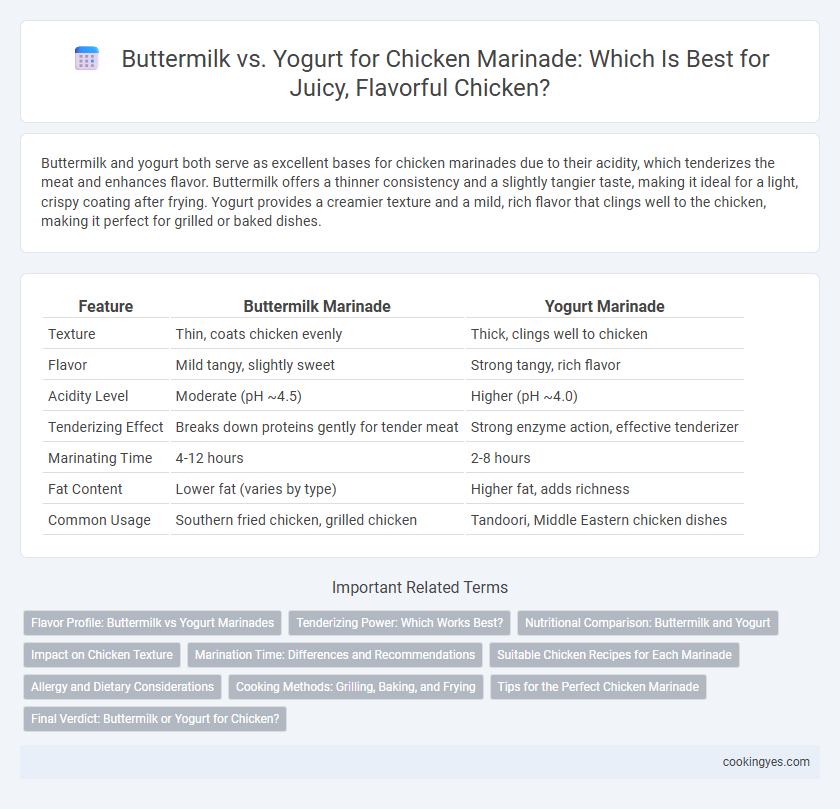Buttermilk and yogurt both serve as excellent bases for chicken marinades due to their acidity, which tenderizes the meat and enhances flavor. Buttermilk offers a thinner consistency and a slightly tangier taste, making it ideal for a light, crispy coating after frying. Yogurt provides a creamier texture and a mild, rich flavor that clings well to the chicken, making it perfect for grilled or baked dishes.
Table of Comparison
| Feature | Buttermilk Marinade | Yogurt Marinade |
|---|---|---|
| Texture | Thin, coats chicken evenly | Thick, clings well to chicken |
| Flavor | Mild tangy, slightly sweet | Strong tangy, rich flavor |
| Acidity Level | Moderate (pH ~4.5) | Higher (pH ~4.0) |
| Tenderizing Effect | Breaks down proteins gently for tender meat | Strong enzyme action, effective tenderizer |
| Marinating Time | 4-12 hours | 2-8 hours |
| Fat Content | Lower fat (varies by type) | Higher fat, adds richness |
| Common Usage | Southern fried chicken, grilled chicken | Tandoori, Middle Eastern chicken dishes |
Flavor Profile: Buttermilk vs Yogurt Marinades
Buttermilk marinades impart a rich, tangy flavor with a subtle sweetness that tenderizes chicken through natural lactic acid, creating a moist and flavorful texture. Yogurt marinades offer a thicker consistency and a more pronounced tartness due to higher acidity, which enhances the depth of flavor while also breaking down proteins effectively. Both buttermilk and yogurt infuse chicken with unique, savory nuances but differ in richness and tang intensity, influencing the final taste and juiciness of the dish.
Tenderizing Power: Which Works Best?
Buttermilk contains lactic acid and enzymes that effectively break down chicken proteins, resulting in a tender and juicy texture, while yogurt's thicker consistency allows for longer marination without over-tenderizing. Both buttermilk and yogurt provide calcium which enhances enzymatic activity, but yogurt's probiotic cultures can add subtle flavor notes to the chicken. For optimal tenderizing power, buttermilk is typically preferred due to its balance of mild acidity and enzymatic action, ensuring consistent, flavorful results.
Nutritional Comparison: Buttermilk and Yogurt
Buttermilk and yogurt both offer probiotic benefits and enhance chicken tenderness through lactic acid content, with yogurt typically providing higher protein levels. Buttermilk contains fewer calories and less fat than full-fat yogurt, making it a lighter option for marination. Both dairy products supply essential nutrients such as calcium, vitamin B12, and potassium, contributing to the overall nutritional value of the chicken dish.
Impact on Chicken Texture
Buttermilk's lactic acid and enzymes penetrate chicken fibers, breaking down proteins for a tender, juicy texture. Yogurt, rich in probiotics and similar acids, also tenderizes but creates a slightly firmer bite due to its thicker consistency. Both enhance moisture retention but buttermilk results in a softer, more delicate chicken texture than yogurt.
Marination Time: Differences and Recommendations
Buttermilk tenderizes chicken more effectively due to its higher acidity and longer recommended marination time, typically 4 to 24 hours, which breaks down proteins and enhances juiciness. Yogurt, slightly less acidic with natural enzymes, requires a shorter marination time of around 1 to 6 hours to avoid over-tenderizing and mushy texture. For optimal flavor and texture, use buttermilk for extended marination and yogurt for quicker preparation.
Suitable Chicken Recipes for Each Marinade
Buttermilk marinade tenderizes fried chicken by breaking down proteins, making it ideal for Southern-style fried chicken and crispy chicken wings. Yogurt marinade, rich in lactic acid and probiotics, works well for grilled or baked chicken recipes like chicken tikka or Mediterranean chicken, enhancing flavor while keeping the meat juicy. Both marinades add distinct textures and tastes suitable for specific chicken preparations based on cooking methods and desired flavor profiles.
Allergy and Dietary Considerations
Buttermilk contains lactose and milk proteins, which may trigger allergic reactions or intolerance in individuals sensitive to dairy, whereas yogurt, especially lactose-free or plant-based varieties, can be a gentler option for those with dairy allergies or lactose intolerance. Both buttermilk and yogurt provide acids and enzymes that tenderize chicken, but choosing yogurt offers more flexibility for specific dietary needs such as vegan or gluten-free diets. Substituting traditional dairy with coconut or almond-based yogurts ensures a safe, flavorful marinade for allergy-conscious consumers.
Cooking Methods: Grilling, Baking, and Frying
Buttermilk and yogurt both tenderize chicken effectively through their lactic acid content, enhancing flavor and moisture retention in grilling, baking, and frying. Buttermilk's higher acidity creates a slightly more pronounced tang and a tender, juicy texture ideal for fried chicken, while yogurt's thicker consistency clings well to the meat, forming a creamy crust during baking or grilling. Choosing between buttermilk and yogurt impacts cooking time and final texture, with buttermilk generally producing a lighter, crispier coating in frying and yogurt providing a richer, more caramelized surface in baking and grilling.
Tips for the Perfect Chicken Marinade
Using buttermilk for chicken marinade enhances tenderness due to its lactic acid content, which breaks down proteins effectively. Yogurt, rich in probiotics and natural enzymes, also tenderizes while imparting a mild tangy flavor that complements spices. For the perfect chicken marinade, maintain a balance of acidity and seasoning, marinate for at least 4 hours, and avoid over-marinating to prevent mushy texture.
Final Verdict: Buttermilk or Yogurt for Chicken?
Buttermilk enhances chicken marinade with its high acidity and enzymes that tenderize meat, resulting in juicier, more flavorful chicken. Yogurt, rich in probiotics and proteins, offers a creamy texture and mild tang that also breaks down proteins effectively while adding moisture. For optimal tenderness and taste, buttermilk is generally preferred due to its stronger acidic properties, but yogurt serves as an excellent alternative for a slightly thicker, creamier marinade.
Buttermilk vs Yogurt for Chicken Marinade Infographic

 cookingyes.com
cookingyes.com